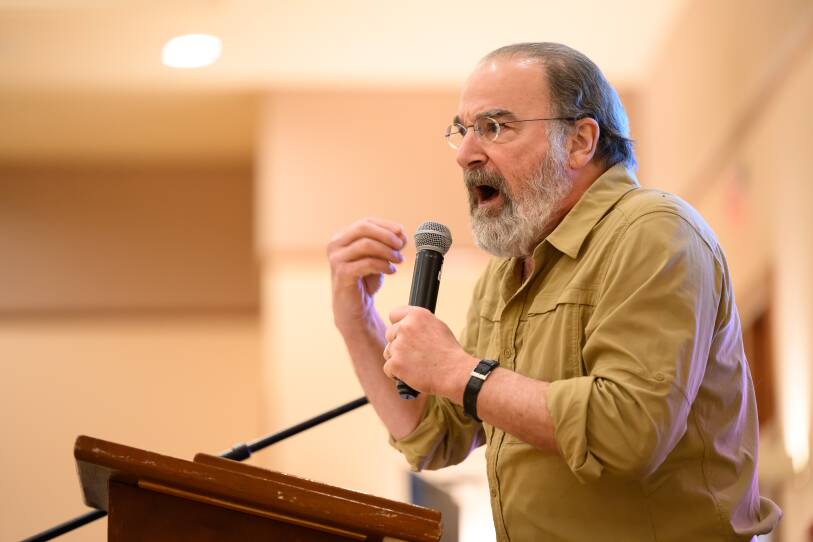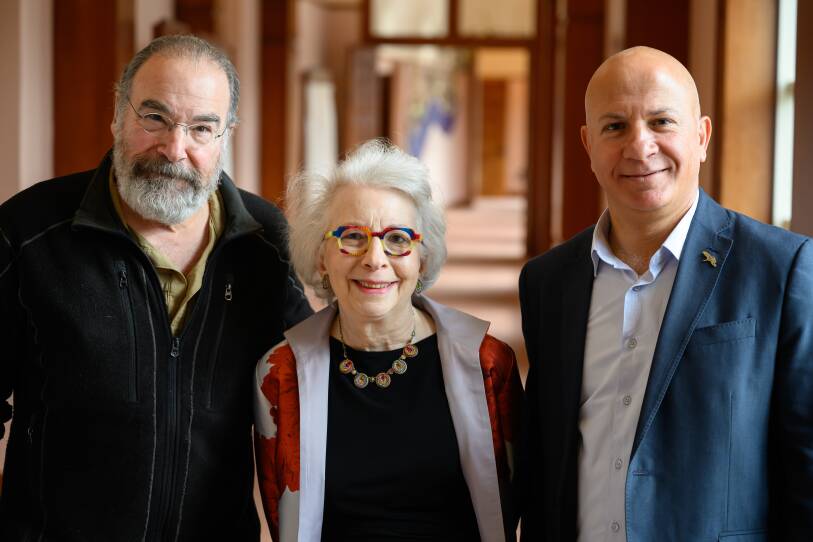An eclectic roster of activists and optimists filled the Temple Emanuel in Newton Sunday, including Israel’s former top scientist, an acclaimed U.S. actor and a handful of Boston-area graduate students.
They were there with about 200 people to get an update on — and raise money for — the Arava Institute for Environmental Studies, an organization that promotes “environmental diplomacy” between Jewish and Arab students from Israel and other countries in a region beset by political violence.
The institute’s campus is in southern Israel. But its fundraising arm, called Friends of the Arava Institute, is based in Newton Centre, Massachusetts. Actor Mandy Patinkin, whose award-winning career in film, television and theatre has spanned nearly half a century, is a board member and attended Sunday's event.
“As they say, water and air have no border crossings,” Patinkin told GBH News. “The hope is that many of these people will become the leaders of their communities, and they will forge relationships with each other, and be able to communicate for the rest of their lives."

From its campus in the Negev desert, the Arava Institute has hosted close to 2,000 students since its inception in 1996. Together, the young participants confront climate challenges throughout the region — as well as their own preconceived notions of one another. Some of their projects include treating wastewater, tapping solar energy and helping farmers increase their productivity.
One of those students is Violet Kopp, a senior at Tufts University studying international conflict and environmental issues. She spent five months at the Arava Institute campus early last year.
"You're in the middle of the desert surrounded by nothing, and kind of forced to talk and make things work," she said.
By day, she worked on projects like sorting bottles, developing a local recycling program and building structures out of mud.
"Then we would spend hours every single night sitting on the balcony overlooking these beautiful mountains sharing a cup of tea and just talking," she said. Conversation topics ranged from "family, music, religion and our relationship with nationalism," she said.
Tareq Abu Hamed is the executive director of the Arava Institute. A Palestinian Israeli who grew up in East Jerusalem, Abu Hamed led Israel's Ministry of Science for several years before joining the institute. He said science is a "universal language," and one that can be used to offset the raging tension felt in the region.
"I strongly believe this conflict is fed by the disconnection between the Israeli society and the Palestinian society. We see each other as enemies, not as humans," he said.
Trust, he said, is the most scarce resource in the Middle East right now. He added he's been lucky to watch trust develop among young people who sign up for the program.
"At the beginning of the semester, you see three groups: Arabs, Jewish Israelis, and international [students]. And within a week or 10 days, you can't tell who is who. They become just one body," he said.

Cohorts of Boston area students pivot
Lori Lefkovitz, who directs the Jewish Studies program at Northeastern University, has taken cohorts of students to the Arava Institute for coursework multiple times.
“What I love about it for our students is the hope that the Arava Institute represents,” she said.
The current bloodshed between Israel and Hamas has impacted the program's ability to recruit students, Lefkovitz said. This year, instead of traveling to the campus in Israel, the cohort from Northeastern will tour Moorish Spain and Morocco to avoid the violence.
The war began with Hamas' attack into southern Israel on Oct. 7 when Palestinian militants killed around 1,200 people, mostly civilians, and abducted some 250 people. Nearly half of the hostages remain in captivity. Gaza's Health Ministry says the death toll of Palestinians is 28,176 since the start of the war. The ministry does not distinguish between civilians and fighters but says most of those killed have been women and children.
It's against that dismal backdrop that the Arava Institute is trying to raise money and spread its message of peace-building. Still, the organization says it will survive the current crisis — and in fact that the kind of collaboration it fosters is critical to long term peace.
As Kopp rounds the final corner on her college career, she has learned to value conversation, especially on sensitive issues.
"Dialogue is way harder than any other peace-building or conflict resolution project. It needs to be in small groups. It needs to be intentional. It requires a lot of emotional labor," she said.
There are so many forces, she said — like "governments, border walls, [and] propaganda"— that, by design, tend to fragment people. But dialogue, she said, defies those structures.
"There's a lot of criticism of dialogue lately," she said. "But if you're not interacting, there's no possible future."
Material from the Associated Press was used in this article.





